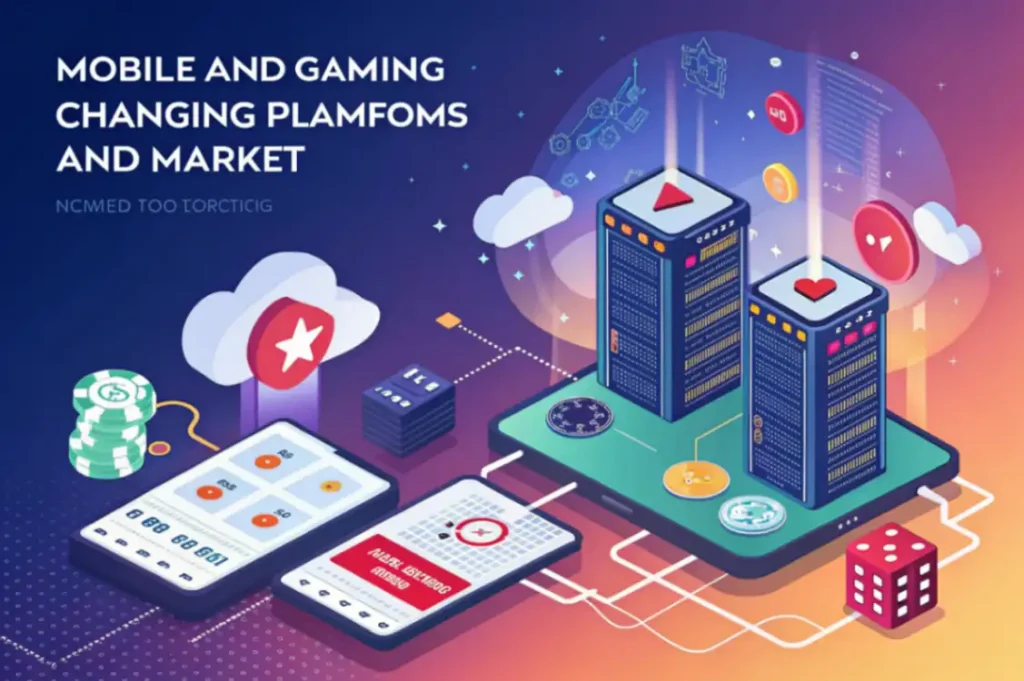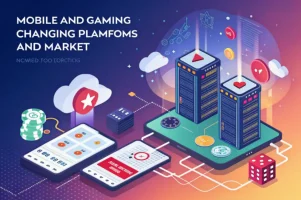The gambling industry has always evolved alongside technology. From the first online casinos to today’s immersive live-dealer experiences, every innovation has brought new opportunities and challenges. However, the rise of mobile and cloud gaming platforms has introduced a shift unlike any other. This transformation has made gambling more accessible, dynamic, and integrated into everyday life.
The following sections explore how these technologies reshape user behavior, regulation, monetization, and the overall structure of the global gambling market.
The Rise of Mobile Gaming and Its Impact on Gambling
The global mobile revolution has fundamentally changed how people play and bet. Smartphones are no longer just communication tools — they’ve become entertainment hubs. The convenience of placing bets or spinning a slot reel anytime, anywhere, has driven massive growth in mobile gambling.
Modern casino operators design their websites and apps with mobile-first principles. Fast-loading pages, intuitive interfaces, and simplified payment flows are now standard. This user-centric approach directly influences player engagement and retention. Moreover, in-game microtransactions and push notifications have become powerful tools for reactivation and personalization.
The shift also extends to demographics. Younger players, who grew up with mobile gaming, now represent a significant portion of the gambling audience. This group expects seamless performance, social interaction, and gamified features rather than static betting screens.
The early adoption of progressive web apps (PWAs), mobile wallets, and touch-based controls has created a unique synergy between entertainment and gambling. Mobile games often blur the line between skill-based competition and wagering, opening new markets for hybrid formats such as eSports betting and fantasy sports.
Before diving deeper into technology-driven strategies, it’s useful to outline the main factors contributing to mobile gambling dominance:
-
Rapid 5G deployment allowing high-speed connections.
-
Improved smartphone hardware supporting advanced graphics and AI.
-
Integration of social and live-streaming features within apps.
-
Growth of secure payment methods like Apple Pay and Google Pay.
-
Global acceptance of crypto wallets for mobile betting.
Each of these factors pushes the boundaries of accessibility, bringing casino experiences closer to users’ pockets than ever before.
Cloud Gaming: The Backbone of the Next-Generation Casino Experience

While mobile platforms dominate accessibility, cloud gaming is transforming scalability and quality. Unlike traditional setups that rely on device power, cloud gaming allows high-end gambling applications to run remotely and stream to any device in real time. This model eliminates the need for expensive hardware and expands the audience to anyone with a stable internet connection.
Cloud architecture enables casino operators to host thousands of concurrent players with minimal latency. It also simplifies software updates — new features, security patches, or game releases can be deployed instantly across the network. Players experience smooth, uninterrupted gameplay, whether they’re betting on roulette or playing skill-based arcade slots.
Another game-changing benefit is cross-platform synchronization. A player can start a poker session on a desktop at home, continue it on a tablet during travel, and finish it on a smartphone — all without losing progress. This seamless continuity strengthens brand loyalty and encourages longer play sessions.
The scalability of cloud systems also reduces operational costs. Traditional physical servers require maintenance, but cloud hosting adapts dynamically to user load. This elasticity is vital during high-traffic events like sports tournaments or promotional weekends.
To better illustrate the benefits of cloud architecture for gambling businesses, let’s look at a comparative table:
| Feature | Traditional Hosting | Cloud Gaming Infrastructure |
|---|---|---|
| Hardware Requirements | High | Minimal |
| Scalability | Limited | Dynamic and automatic |
| Latency | Device-dependent | Low, optimized by CDN |
| Maintenance Costs | Expensive | Pay-as-you-go model |
| Player Accessibility | Restricted | Global and device-agnostic |
As shown, cloud-based gambling offers a clear technological and economic advantage, setting the stage for a new era of digital casinos.
Security, Regulation, and Responsible Gaming in the Cloud Era
As gambling becomes increasingly digital, questions about security, fairness, and responsible behavior grow more pressing. Mobile and cloud platforms introduce complex ecosystems of payment gateways, user data, and real-time analytics — all of which must be protected.
Cloud encryption technologies and blockchain-based verification systems now form the backbone of modern iGaming security. Operators can track every transaction transparently, preventing fraud and ensuring compliance with international regulations. Moreover, machine learning algorithms analyze player behavior to detect unusual patterns, identifying potential problem gambling early.
Mobile and cloud infrastructure also facilitate geolocation tracking and identity verification, both critical for meeting regulatory demands. By using biometric authentication, two-factor login, and secure tokens, platforms prevent unauthorized access and underage gambling.
From a legal standpoint, regulators are adapting quickly. Many jurisdictions now require operators to host data in specific regions or meet certain latency thresholds to maintain local compliance. This has prompted major gambling companies to partner with trusted cloud providers like AWS, Google Cloud, and Azure, which offer certified compliance with data protection standards.
However, the responsibility does not end with the operator. Players must also engage with tools that promote healthy gambling habits. Most modern platforms include built-in limits, session reminders, and voluntary self-exclusion options. These features, powered by AI analytics, make responsible gaming more proactive and personalized.
To summarize the main compliance trends influencing mobile and cloud gambling today:
-
Mandatory encryption of player data across regions.
-
Integration of AI-driven fraud detection systems.
-
Use of blockchain for transaction transparency.
-
Dynamic KYC (Know Your Customer) and geolocation checks.
-
Expansion of international cooperation between regulators.
This regulatory evolution ensures that the gambling revolution remains both secure and ethical.
The Evolution of Player Experience and Social Interaction
Mobile and cloud gaming platforms have transformed not just how people gamble but also how they connect. Gambling is no longer a solitary experience. Through live chats, multiplayer tournaments, and social leaderboards, casinos now resemble vibrant digital communities.
Streaming platforms like Twitch and YouTube have amplified this transformation. Professional gamblers and streamers broadcast live sessions, attracting thousands of viewers who engage through comments, reactions, and even micro-bets. This merging of entertainment and gambling fosters new revenue streams and brand exposure.
Cloud technology plays a critical role here. It enables real-time interactivity with minimal delay, ensuring that social components — such as virtual tables or chat rooms — operate smoothly across devices. For mobile users, this creates a sense of inclusion and competition similar to in-person casinos.
Furthermore, developers are experimenting with gamification mechanics, rewarding users with achievements, collectibles, and bonus challenges. These systems not only enhance engagement but also appeal to the same motivations that drive success in mainstream gaming — progress, recognition, and social comparison.
Let’s explore some of the most influential features that define the modern player experience:
-
Live-dealer games streamed in HD.
-
Interactive chat and friend systems.
-
Cloud-based tournaments with global leaderboards.
-
Loyalty programs and in-game rewards.
-
Seamless transitions between real-money and free-play modes.
The blending of social and gambling elements ensures that platforms evolve beyond transactions into entertainment ecosystems. The result is a more inclusive, immersive, and engaging gambling culture.
Market Outlook: Innovation, Competition, and Future Trends
Looking ahead, the convergence of mobile and cloud gaming will continue to shape the future of online gambling. With emerging technologies like augmented reality (AR), virtual reality (VR), and AI-driven personalization, casinos are entering an era of hyper-customization.
Mobile-first design will remain essential, but the focus is shifting toward cross-device ecosystems — where smartphones, smart TVs, and wearables all work together. Cloud platforms will support this evolution by providing the computational backbone necessary for complex 3D environments and real-time betting analytics.
Economically, this shift is intensifying competition. Startups can now enter the market with fewer upfront costs, while established brands must continuously innovate to retain their edge. Cloud scalability makes global expansion faster, but it also increases the need for cultural and legal localization.
From the player’s perspective, personalization will dominate the next phase. AI will analyze preferences, habits, and emotional cues to suggest games, set limits, and even predict risk tolerance. This data-driven approach can make gambling both safer and more engaging.
As innovation continues, several key directions are expected to define the decade ahead:
-
Integration of VR casinos with realistic avatars.
-
Expansion of crypto-friendly betting ecosystems.
-
Growth of AI-based game balancing and odds generation.
-
Stronger partnerships between cloud providers and regulators.
-
Emphasis on green, energy-efficient server operations.
The convergence of technology, entertainment, and regulation marks the beginning of a new era — one where gambling becomes more personalized, interactive, and responsible than ever before.
Conclusion: The New Digital Frontier of Gambling
Mobile and cloud gaming platforms are not just changing how gambling is delivered; they’re redefining its essence. Accessibility, scalability, and personalization have become the cornerstones of the industry’s digital evolution. What once required a physical casino or desktop setup can now fit in the palm of your hand.
For operators, this transformation brings vast opportunities to expand and innovate, but also new challenges in regulation and player protection. For players, it promises unprecedented freedom — to play, connect, and engage wherever they are.
As technology continues to advance, one thing is certain: the synergy between mobile and cloud gaming will remain the driving force behind the next generation of digital gambling experiences.

